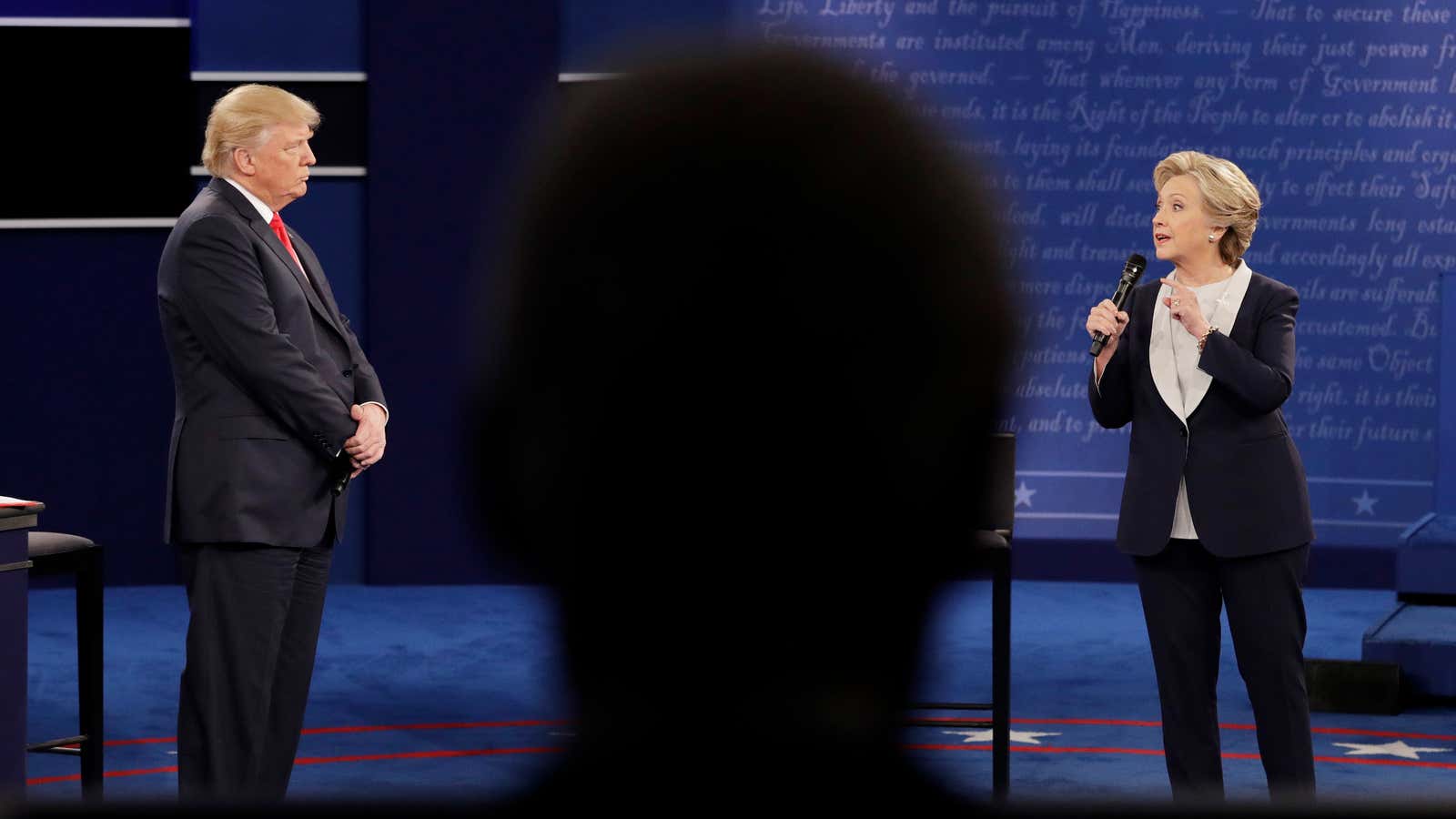Donald Trump’s poll numbers are slipping nationwide. Hillary Clinton is poised to be the first Democratic presidential candidate in decades to possibly win in Republican stronghold states like Utah, Arizona, and Georgia. Once solidly purple battlegrounds like Colorado and Wisconsin look like inevitable wins for Clinton as well. Indeed, when Americans head to the polls on Nov. 8, it’s appearing increasingly likely that the results will be a landslide in her favor.
The reality of the situation is perhaps what has inspired Trump to lean heavily on (unsubstantiated) rhetoric of a a “rigged” election:
Trump’s campaign manager, Kellyanne Conway, has chosen to focus on the former portion of the above tweet—that in focusing on alleged sexual misconduct by the candidate, the media has unfairly thrown the race to Clinton.
And if this is the Trump campaign’s official position—that the media has made this an impossible race to win—there doesn’t seem to be much impetus for participating in the third and final presidential debate to take place in Las Vegas, Nevada on Wednesday (Oct. 19).
Presidential debates in the United States, after all, are moderated by journalists. (Notably, ABC News correspondent Martha Raddatz, who moderated the last debate with CNN’s Anderson Cooper, weathered heavy criticism from Trump supporters for perceived unfairness toward the candidate, after doggedly keeping him from digressing in his answers.) And if the Trump campaign is pinning its reputation to an adversarial relationship with the press, why entertain the media on its own turf?
Trump himself has already declared the convention as—predictably—rigged against him.
Still, some say the third debate constitutes a final lifeline for the floundering Republican campaign. “The GOP nominee can still seize momentum in the 2016 contest if he beats Clinton on the issues,” writes Eddie Zipperer in a column for Fox News—namely, maintaining a framework on this campaign cycle as an us-against-them, working-class-vs.-the-Establishment dynamic:
“If the third debate were a NASCAR race, Donald Trump would win easy. Hillary Clinton’s racing suit would have patches with the logos of all her corporate sponsors and big donors; Trump—whose campaign is funded by small donations—would have the logo of the American people, a US flag, and that alone would tell the story. The audience would know to jeer when Hillary Clinton claims she wants to get “dark money” out of politics. If she really wanted to get dark money out of politics, she’d retire.”
The third debate also presents Trump with an opportunity to double-down on the message of an illegitimate electoral system in front of record-breaking audience numbers. And there’s some concrete motivation to keep things negative.
“Nasty debates sometimes suppress turnout by turning off uncommitted voters,” writes Gerald F. Seib for The Wall Street Journal. “and it appears Mr. Trump would be fine with such an outcome on the calculation that casual voters driven away now likely would otherwise be Clinton voters.”
This is where the third debate might be equally important for Clinton. It’s an opportunity to emphasize the positive potentialities of her presidency and inspire the kind of turnout that will produce her campaign’s much-hoped-for landslide.
It will also be Clinton’s first chance to publicly address what has been learned from the hacking of campaign chairman John Podesta’s emails and other recent information dumps courtesy of Wikileaks. This is probably the last loose end for the Clinton campaign to tie up. If she can convincingly put the issue to bed, and stay positive, virtually nothing stands in the way of a solid Clinton victory come Nov. 8.
Still some advise that Clinton would be better served by disengaging from Trump’s antics on every level—to embrace Michelle Obama’s maxim: “When the go low, we go high.”




